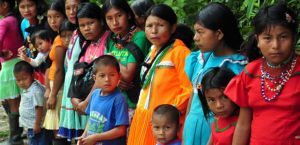For some time now, indigenous communities have been gaining more relevance in environmental decisions and biodiversity conservation. For this reason, at the COP16 conference in Cali, attendees agreed to vote in favor of strengthening the status of local and indigenous communities in future United Nations negotiations, a decision supported by the European Commission.
The spokesman for the Peruvian indigenous organization CECONSEC, Teddy Sinacay Tomas, mentioned that governments are “too slow,” which is why they seek to make their voices heard and be involved in decision-making, even though they are denied the opportunity. Furthermore, the spokesman commented that those who live in and defend the Amazon region are these communities, so they demand that their right to legally defend these lands be recognized.
On the other hand, many representatives of Latin American indigenous peoples traveled to Colombia to request formal recognition of their role in biodiversity conservation.
During the last summit, the UN decided to officially adopt article 8J, which recognizes the importance of indigenous communities in protecting biodiversity and nature. In this sense, María Cristina Pizario, from the Wounann-Noman indigenous community in Colombia, added that if communities were able to take care of the land, “others can do it too.”
 Indigenous communities demand to be part of environmental decision-making.
Indigenous communities demand to be part of environmental decision-making.
Indigenous Communities with the Support of the European Union
According to experts, deforestation is one of the main causes related to biodiversity loss worldwide, along with fishing, hunting, pollution, climate change, and invasive species. In fact, in 2023, the European Union signed legislation to curb deforestation, prohibiting access to the European market for products such as coffee, cocoa, and beef, as they are considered to be produced on deforested land.
Furthermore, the EU carried out a financing program to support local communities and indigenous peoples worldwide. Regarding this assistance, the European Union stated that they were able to verify that the projects funded by them contributed to restoring and protecting the environment, as well as serving as a source of employment.
This article not only recognizes the role of local and indigenous communities but also the role of rural populations, both farmers and forestry workers, as they are the ones who work the land and help keep ecosystems alive.
Have you visited our YouTube channel yet? Subscribe now!

